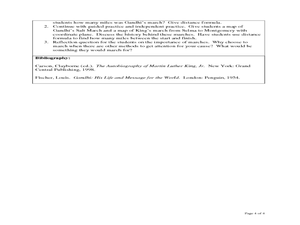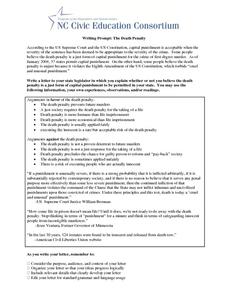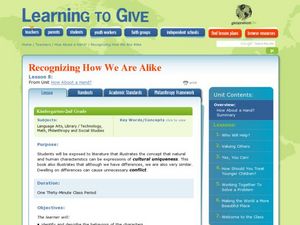Curated OER
The Spread of Enlightenment Ideas
Looking for a simple and straightforward reference on the Enlightenment for your young historians? Check out this list of key terms and important figures from the period, followed by a traditional assessment where your learners will be...
Curated OER
The Distance Formula and Marching Nonviolently for Social Change
Students explore the distance formula using real world data from nonviolent marches for social change. In this secondary mathematics lesson, students investigate the marches of Gandhi and King using maps overlaid with a coordinate...
Museum of Tolerance
The Price of Personal Responsibility
A reading of Patrick Henry's "Speech in the Virginia Convention," Henry David Thoreau's "Civil Disobedience," and Rev. Martin Luther King, Jr.'s "Letter from Birmingham Jail" launch a discussion about the price one is willing to pay to...
Curated OER
Bias and Crime in Media
Critical thinking and social justice are central themes for this resource on bias and crime in media. The class views and discusses an incisive PSA that highlights assumptions based on race. Small groups read newspaper opinion pieces...
Carolina K-12
Writing Prompt: The Death Penalty
Is the death penalty unjust because it violates the Eighth Amendment of the United States Constitution, "cruel and unusual punishment"? Or is it just a form of permissible capital punishment? After weighing arguments for and against the...
Pulitzer Center
"Voices from Haiti": Using Poetry to Speak up for a Cause
Explore a real world use of poetry with your class! Young language arts pupils consider the concept of advocacy and how journalism, photography, and poetry can raise awareness for a cause. They read several poems about individuals...
Curated OER
People for Successful Corean Reunification (PSCORE)
Students explore the concept of human rights. In this social justice lesson, students explore vocabulary regarding human rights and human rights violations in North Korea.
Curated OER
Justice for All? Debating the Fairness of the Juvenile Justice System
Students discuss treatment of young people by the criminal justice system and debate whether or not that treatment is fair.
Curated OER
Social Boundaries Activity: Map It Out
Middle schoolers observe the school for one week to identify social boundaries. In this map it out activity, students sketch the school's social boundaries, identifying where social cliques hang out. Middle...
Curated OER
Stories of Freedom and Justice: Learning Resources
Students are introduce to the topic of nonviolence and civil rights by watching a video. In this stories of freedom activity, students examine the Supreme Court's role in interpreting the U.S. Constitution. Students analyze how conflict...
BBC
Crime: Justice
Are the juvenile courts fair? Learners read a bit from the classic Oliver Twist to consider how young people are treated and represented when they've been accused of a crime. They read a case study from their books, discuss children's...
Curated OER
Recognizing How We Are Alike
Young scholars explore the concept of social justice. In this service learning worksheet, students read The Sneeches in order to appreciate cultural uniqueness.
USA.gov
How The Supreme Court Works
Just how does a case come before the highest court in the land? A graphic flow chart unpacks how plaintiffs come before the Supreme Court. Graphics include background on the nine justices and just how many cases they actually hear each...
Learning to Live
Attributes of a Civil Society
What makes a society civil? High school freshmen search for examples of justice, kindness, peace, and tolerance in news media and brainstorm how they can promote these attributes in their schools, communities, and world. The well-rounded...
Curated OER
South Africa's Apartheid
Discuss South African apartheid, the anti-apartheid movement, and the literature and music it inspired. Slides contain images and facts about life in South Africa during apartheid, social uprisings such as Soweto, and the various...
Facing History and Ourselves
Taking Ownership of the Law
The work of building and maintaining a democracy is, in the words of Justice William Hastie, "never finished." To better understand what Hastie sees as an ongoing building process, class members listen to a seven-minute podcast about two...
Curated OER
The Media and Social Justice in the United States
Students have group discussions that allow the teacher to assess the level of comprehension of the ideas of subjectivity and objectivity. Level of discussion at the end of the class provides some indication of comprehension as well....
State Bar of Texas
Roe v. Wade
At what point does the right of privacy end and the government begin? Scholars research rights under the Ninth Amendment to the Constitution. Using the 1973 Roe v. Wade Supreme Court case as a starting point, along with small group work...
State Bar of Texas
Grutter v. Bollinger
A university decides not to allow a qualified scholar to enter its institution based on skin and gender—but this case is about a white female? The 2003 Supreme Court case Grutter v. Bollinger lays the foundation for open discussion and...
iCivics
We The Jury
A jury must decide: are the names of two businesses so similar that one is hurt by customer confusion? Learners play the role of a juror who must decide—and convince others—whether Trio Taco and Trio Pizza are too similar. Using...
Curated OER
A Voice for Hard Issues
Ouch! The final lesson in the 12-resource poetry unit models for young writers how poems can be used to voice hard truths.
Curated OER
Mesopotamian Gods: Handout
Ancient religion was often times closely linked to social structure and government. Hand out a handy guide that describes 12 major gods and goddesses from ancient Mesopotamia. They are each connected to a location, symbol, and force of...
Alabama Department of Archives and History
Montgomery Bus Boycott: We Would Rather Walk!
Have historians use primary sources to learn about the circumstances and implementation of the Montgomery Bus Boycott, and think about the issue of boycotts as a means of effecting social change. Wrap it up with a...
Free Library of Philadelphia
Resources for Ghost Boys
Jewell Parker Rhodes, the author of Ghost Boys, wanted to bring the historical legacy of Emmett Till and the current topic of racial prejudice into today's young readers' mindsets. Use a reading guide and set of discussion questions to...

























